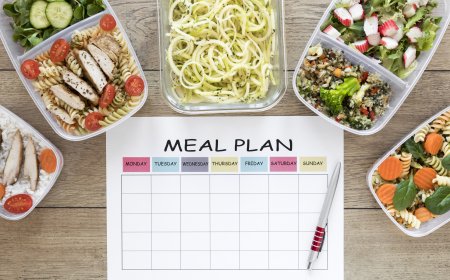Weight Management and Nutrition: How to Balance Your Diet for Lasting Results
Learn how weight management and nutrition work together to achieve lasting health. Discover simple tips, best foods, myths busted, and a sample meal plan for sustainable weight control.

Weight Management and Nutrition: Balance Your Diet with Lean Fasting
Maintaining a healthy body weight is more than just cutting calories or spending hours at the gym. Weight management and nutrition go hand in hand when it comes to achieving lasting, sustainable health results. Good nutrition supports your body's metabolism, energy levels, and fat-burning processes, making it easier to maintain a healthy weight.
In this guide, you'll discover the critical link between weight management and nutrition, key principles to follow, best foods for managing weight, and practical tips for building a healthy, balanced lifestyle.
What is the Connection Between Weight Management and Nutrition?
Your body's weight is directly influenced by the quality and quantity of food you consume. Poor nutrition habits like overeating processed foods or skipping meals can sabotage your efforts.
Proper weight management and nutrition ensure that your body gets the right balance of macronutrients—carbohydrates, proteins, and fats—as well as essential vitamins and minerals.
A balanced diet stabilizes blood sugar, boosts metabolism, and prevents fat storage.
Without good nutrition, even the most rigorous workout routines fail to deliver the desired results.
Key Nutritional Principles for Effective Weight Management
Focusing on core nutritional principles can make your weight management journey smoother:
- Prioritize Whole Foods: Fresh fruits, vegetables, lean proteins, and whole grains should dominate your plate.
- Balance Macronutrients: Ensure every meal has a balance of healthy carbs, quality protein, and good fats.
- Eat Enough Fiber: Fiber-rich foods help with digestion and create a feeling of fullness.
- Stay Hydrated: Water plays a vital role in metabolism and appetite regulation.
These basic steps are the foundation of sustainable weight management and nutrition.
Best Foods for Weight Management
Choosing the right foods simplifies the weight management process:
- Lean Proteins: Chicken breast, tofu, fish, legumes
- Healthy Fats: Avocados, olive oil, nuts, seeds
- Complex Carbohydrates: Sweet potatoes, quinoa, oats
- Fiber-Rich Veggies: Broccoli, spinach, carrots
Adding these foods to your diet enhances nutrient intake while promoting fullness and satisfaction.
Common Myths About Weight Management and Nutrition
Let's bust a few myths that often confuse people:
- Myth 1: Skipping meals helps you lose weight faster.
Truth: It slows metabolism and can lead to overeating later. - Myth 2: All carbs are bad.
Truth: Complex carbs are essential for energy and satiety. - Myth 3: Fat makes you fat.
Truth: Healthy fats are necessary for hormone regulation and nutrient absorption.
Understanding facts about weight management and nutrition makes your journey more effective.
Sample One-Day Weight Management Meal Plan
Here's a simple plan to guide you:
- Breakfast: Oatmeal with chia seeds and berries
- Snack: Greek yogurt with almonds
- Lunch: Grilled chicken salad with olive oil dressing
- Snack: Apple with peanut butter
- Dinner: Baked salmon with quinoa and steamed broccoli
This meal plan emphasizes balance and promotes lasting weight management and nutrition success.
How Exercise Supports Weight Management and Nutrition
While nutrition is the king, exercise acts as a powerful ally. Regular physical activity helps maintain lean muscle mass, burns calories, and enhances metabolism.
- Strength training preserves muscles during weight loss.
- Cardio exercises improve heart health and increase calorie burn.
- Flexibility workouts like yoga reduce stress and promote mindful eating.
Combining good nutrition with exercise accelerates your weight management goals.
Mistakes to Avoid in Your Weight Management Journey
- Skipping Meals: Leads to slower metabolism and cravings.
- Over-restricting Calories: Causes nutrient deficiencies and fatigue.
- Ignoring Hydration: Dehydration can mimic hunger signals.
- Trusting Fad Diets: Quick fixes often backfire long-term.
Stay consistent, eat balanced meals, and listen to your body's signals.
Conclusion
Mastering weight management and nutrition is a long-term commitment, not a quick fix. Focus on eating balanced meals, making healthier food choices, staying active, and being consistent. These simple yet powerful steps will lead you to sustainable weight control and a healthier, more energetic life.
Remember, every small change matters. Start today, stay consistent, and experience the lasting transformation you deserve!
Want to supercharge your fat loss journey?
Learn how a Metabolic Reset can help you break through weight loss plateaus and speed up your fat-burning process naturally. Discover science-backed strategies to reboot your metabolism for lasting results.
Explore the full guide: Metabolic Reset for Fat Loss
FAQs About Weight Management and Nutrition
Q1. Can I manage my weight through diet alone?
Yes, diet plays a dominant role in weight management, but combining it with regular exercise yields the best results.
Q2. How long before I see results with better nutrition?
Visible changes may take 3–6 weeks of consistent practice, depending on your starting point and adherence.
Q3. Should I use supplements for weight management?
Supplements can support a diet but should not replace whole foods. Always prioritize nutrition from natural sources first.
Q4. What's the best tip for sustainable weight management?
Focus on small, consistent changes rather than drastic, unsustainable diets.





























